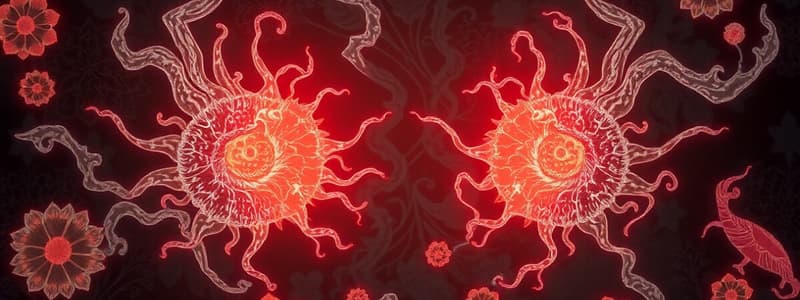Podcast
Questions and Answers
What is the primary function of primordial germ cells?
What is the primary function of primordial germ cells?
- To form the tissues of the body.
- To mature into gametes for reproduction. (correct)
- To develop into somatic cells.
- To regulate hormonal balance.
Which of the following best describes the developmental pathway of primordial germ cells?
Which of the following best describes the developmental pathway of primordial germ cells?
- They create the initial foundation for blood vessels.
- They transform into somatic cells of the body.
- They mature specifically into sperm or eggs. (correct)
- They differentiate into various organ tissues.
If primordial germ cells were unable to develop, what would be the most direct consequence?
If primordial germ cells were unable to develop, what would be the most direct consequence?
- An inability for the organism to develop.
- A disruption in cartilage formation.
- An inability to produce blood cells.
- A failure in the process of producing new organisms. (correct)
How do primordial germ cells contribute to the continuity of life?
How do primordial germ cells contribute to the continuity of life?
What is the essential role of primordial germ cells in the process of reproduction?
What is the essential role of primordial germ cells in the process of reproduction?
Flashcards
What are primordial germ cells (PGCs)?
What are primordial germ cells (PGCs)?
The earliest cells that will eventually develop into sperm or eggs, thus playing a crucial role in reproduction.
What do PGCs mature into?
What do PGCs mature into?
Sperm and eggs, produced by the PGCs. They fuse to create a zygote, initiating a new organism.
What is a zygote?
What is a zygote?
A new fertilized egg formed by the combination of a sperm and an egg.
What's the significance of PGCs in reproduction?
What's the significance of PGCs in reproduction?
Signup and view all the flashcards
What is a key characteristic of PGCs?
What is a key characteristic of PGCs?
Signup and view all the flashcards
Study Notes
Primordial Germ Cells
- Primordial germ cells (PGCs) are precursors to sperm and eggs
- They create a new organism, continuing generations through germ cells
- In simpler terms, PGCs develop into male and female gametes (sex cells)
Studying That Suits You
Use AI to generate personalized quizzes and flashcards to suit your learning preferences.




